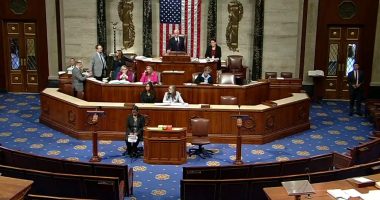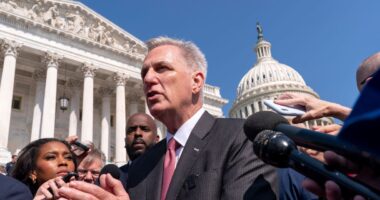
WASHINGTON — Democrats appear to have abandoned hope of getting any Republican support for the next round of Covid-19 relief and, instead of entertaining talks to shrink the president’s $1.9 trillion proposal, are determined to go big.
A new addition to President Joe Biden’s plan is coming from Rep. Richard Neal, D-Mass., the chair of the House Ways and Means Committee and a key figure in crafting the bill, who wants to add monthly cash payments totaling $3,600 per year for every child under the age of 6, or $3,000 for children from 6 to 17.
Democrats have been yearning to act boldly on coronavirus aid, haunted by what-ifs from 2009 when they passed a pared-down stimulus package in the wake of the financial collapse, only to suffer for it as a slow recovery led to a bruising midterm election defeat in 2010.
Biden has sought to pave the way for that new approach by arguing that borrowing rates are low and now isn’t the time to fear red ink.
The concept of a child allowance has been percolating in progressive policy circles for years. The Center for American Progress, a liberal group, made a case for it in 2015. In 2017, dozens of Democrats got behind a bill called the American Family Act that resembles the contours of the new Neal plan. A recent study by Columbia University found that it would reduce child poverty by 42 percent.
Nearly 11 million children in the U.S. — about 1 in 7 — are living in poverty, according to a paper by the center last month. It ranks as one of the highest rates of child poverty in the developed world.
“The era of small government is over. The era of small deficits is over. We are all Keynesians now,” said Sean McElwee, who co-founded and runs the left-leaning Data For Progress.
McElwee said it’s good policy and good politics for Democrats to embrace aggressive — and expensive — economic policies that resemble the New Deal.
Prominent figures in the party agree.
“At the end of the day, the American people want results. They are hurting,” Sen. Bernie Sanders, I-Vt., the chairman of the Budget Committee, told NBC News. “And overwhelming numbers of the American people know that we have to deal with the health crisis, the pandemic, the economic crisis, the education crisis. That’s what they want us to do, and that’s what we will do.”
Seth Hanlon, a senior fellow at the center, said the child allowance addresses a flaw in the existing Child Tax Credit, which is only partially refundable. While the cost may be high, he argued that if Congress establishes the program for one year in a reconciliation bill, “there will be lots of political pressure to make it permanent.”
“The ACA — Biden called that a ‘big f—ing deal,’ and I think this is of the same magnitude in terms of investment in children,” Hanlon said, referring to the Affordable Care Act. “This is a really historic step forward in combating poverty.”
A return to New Deal-style governance
For Democrats, the aggressive approach is a sea change after decades of echoing Republicans on the risks of a rising national debt.
The party pivoted away from a deficit-financed safety net after suffering crushing defeats to Ronald Reagan in the 1980s as he rallied the country behind a vision of smaller government. Bill Clinton acceded to that view in 1996 when he declared, “the era of big government is over,” and the philosophy carried through the Obama White House, which put a premium on deficit-reduction, amid heavy pressure from conservatives, to avoid being seen as too far left.
Now, after decades of rising income inequality and amid a pandemic that has ravaged millions of Americans financially, Democrats are betting the public appetite for government programs has grown.
Some, including Senate Majority Leader Chuck Schumer, D-N.Y., say they made a mistake in 2009 by doing too little in response to the economic crisis.
McElwee said that Rahm Emanuel, President Barack Obama’s first chief of staff, “came up with this arbitrary thing where, if it’s over a trillion, it’s a problem. And now we’ve blown past that.”
He added, “Joe Biden understands that whether or not he has political capital a year from now is going to be determined exclusively by: Is the coronavirus relief working and are people getting back to work?”
Biden’s $1.9 trillion package includes $1,400 direct payments and $400 jobless aid, plus vaccine funds, health care subsidies and money for rent, food stamps and public transit. His advisers have circulated surveys showing broad public support, including a recent Quinnipiac poll that showed 68 percent of U.S. adults favor it, while 24 percent oppose it.
Republican lawmakers broadly reject the plan, saying the president hasn’t justified the need for so much spending. But some Republicans have softened their hard-nosed message on cutting the safety net to reduce the debt.
Sen. Josh Hawley, R-Mo., recently teamed up with Sanders to push for $2,000 direct payments. Sen. Mitt Romney, R-Utah, last week unveiled a plan to replace the Child Tax Credit with a more generous monthly payment for parents of $350 for young children and $250 for school-age kids. Romney’s plan would be funded by cutting other programs that Democrats want to preserve.
A realignment in party coalitions is fueling the shift. Affluent suburbanites are breaking away from the GOP and making it more reliant on white voters without a college degree — a centerpiece of the New Deal Democratic coalition — who would benefit from a larger safety net.
“American families are facing greater financial strain, worsened by the Covid-19 pandemic, and marriage and birth rates are at an all-time low,” said Romney, the GOP’s 2012 presidential nominee. “Now is the time to renew our commitment to families to help them meet the challenges they face as they take on most important work any of us will ever do — raising our society’s children.”
Source: | This article originally belongs to Nbcnews.com

















